In this Jan. 5, 2016 photo, Central American migrants embrace as they wait for assistance at a center for newly-arrived migrant families with children, at Sacred Heart Catholic Church in McAllen, Texas. Assistance includes clothes, a meal, a shower and access to medical care. Migrants pass through the center after being processed by U.S. immigration authorities, who outfit parents with ankle monitors and ensure that migrants' relatives have purchased bus tickets for their onward journey within the U.S. (AP Photo/Rebecca Blackwell)
The Associated Press
REYNOSA, Mexico (AP) - The young Salvadoran woman was robbed and forced to dodge kidnappers working for a drug cartel during her four-month odyssey to this border city of belching factories and swirling dust across the Rio Grande from Texas.
She hoped to be on the other side long before Pope Francis visits the region next month and delivers what promises to be a highly symbolic homily addressing immigration. Hundreds of thousands of pilgrims will flock to the border to hear him speak, and America's political class will likely be listening as well. Francis' Feb. 17 Mass in Ciudad Juarez comes just eight days after the New Hampshire primaries, and three before contests in South Carolina and Nevada.
Immigration has been a hot-button campaign issue particularly among Republican hopefuls such as Donald Trump and Ted Cruz, who have taken an increasingly hard line with Trump vowing to deport the more than 11 million immigrants living in the country illegally and Cruz aiming to end birthright citizenship for their U.S.-born children. It is also an issue close to Francis' heart, and while analysts doubt he will wade too blatantly into the political thicket, his very presence along the border speaking on the issue will turn heads.
"Migration is a complicated situation and he's not going to ignore the demands of national sovereignty ... (but) he's calling for a more open and generous approach," said Tom Quigley, former Latin America policy adviser for the U.S. Conference of Catholic Bishops. "You can't assume that he's going to say 'You all come,' but he will clearly be urging the United States government, implicitly at least, to find ways of addressing the reasons why people are leaving El Salvador and Honduras and other countries."
For the Salvadoran woman, who gave only her last name, Miranda, all the talk makes little difference to her plans. She said she was not even aware the Pope was coming, and nothing Trump or the other candidates say can dissuade her from seeking a better life.
Back home in El Salvador - which last year recorded a homicide rate of 103 per 100,000 inhabitants, believed to be the highest of any country not in open war - she faced death threats from hyper-violent gangs that rule entire neighborhoods largely unchallenged.
"It does not make you want to go less," Miranda said of the rhetoric, "because you know that immigration is never going to stop."
Violence is also rampant in neighboring Guatemala and Honduras, the latter of which had been the world's reigning murder capital in recent years. Gangs in all three countries kill with impunity, extort broad swaths of the population and recruit young people so aggressively that some stop attending school or even leaving home.
Living in many parts of those countries "is like living in a dark, dangerous, dead-end alley, and migration is a dark, dangerous tunnel - but it's a tunnel," said Kay Andrade Eekhoff, who works for Catholic Relief Services in El Salvador overseeing programs for at-risk Central American youth.
Statistics show that many continue to risk the tunnel, despite a surge in enforcement by the U.S. and by Mexico along its own southern frontier. U.S. Customs and Border Protection says apprehensions of unaccompanied children mostly from Central America totaled 17,370 in October-December. That was up 117 percent from the same period a year earlier, while apprehensions of families rose 187 percent. Still, total detentions remain well below historic highs.
Immigration and Customs Enforcement agents on Jan. 2 began rounding up Central American immigrants who entered without permission since May 2014.
Earlier this month Secretary of State John Kerry announced an expansion of a program letting Central Americans apply for refugee status before traveling north. But some say they may not qualify, or it's simply too dangerous to wait.
Those in a hurry include a 20-year-old man in San Salvador who was deported from the U.S. just months ago. On his last trip north, last summer, the Gulf drug cartel kidnapped and held him in Reynosa for five weeks until his family scraped together ransom. U.S. border agents later captured and sent him home. A police officer's son, he's now planning to try again after getting gang threats.
"They told me if I did not join them, something was going to happen to me or my dad," the man said, speaking on condition of anonymity for fear of gang reprisals.
Francis has made the plight of migrants one of the hallmarks of his papacy, denouncing what he called the "globalization of indifference" toward people desperate to flee poverty and persecution. He has taken his message of compassion to Lampedusa, Italy, destination for many African migrants, and to the European Union and the United Nations.
Last fall in the U.S. Congress, Francis lectured lawmakers that "we must not be taken aback by (migrants') numbers but rather view them as persons." He reminded them that they, too, descended from immigrants drawn by the dream of a new future.
In Ciudad Juarez, the Argentine-born Francis plans to celebrate Mass in a huge open field on the border and then walk to the Rio Grande to salute people on the other side in a powerful show of solidarity with his Latin American compatriots. Vatican officials say he intends to address violence and drug trafficking as well. Francis will also come close to fulfilling his wish to cross the border during the U.S. visit, something that was ultimately scrapped for logistical reasons.
It's a message that resonates with Sister Norma Pimentel, director of Catholic Charities of the Rio Grande Valley.
"They are people and we need to treat them that way," said Pimentel, whose work Francis has praised and who was invited to meet him in New York last year. "They need our help, and so we welcome them to restore their dignity."
Pimentel's center at the Sacred Heart church in McAllen receives about 100 migrants a day who have been detained, processed and released by the Border Patrol. Each adult gets an electronic monitoring anklet to ensure they make court appearances.
On a recent morning, Erica Johana Garcia was breakfasting with her two children at the center before catching a bus for the final leg of their journey to Los Angeles. They left Guatemala after thugs told her 15-year-old son they would rape his 8-year-old sister if he didn't join their gang.
Fingering her ankle bracelet, Garcia, 34, vowed to fight to be able to stay.
"I can't go back because I risk my children," she said, "especially my son."
___
Associated Press writers Peter Orsi in Mexico City and Nicole Winfield in Rome contributed.
In this Jan. 5, 2016 photo, drawers of bras, underwear and socks, organized by gender and size, line a wall at a center that provides assistance to newly-arrived migrant families with children, at Sacred Heart Catholic Church in McAllen, Texas. The reception center at the church in McAllen receives families caught and processed by Border Patrol, about 100 immigrants each day. (AP Photo/Rebecca Blackwell)
The Associated Press
In this Jan. 4, 2016 photo, Ramon Rodriguez of El Salvador holds his feverish 18-month-old son Dylan at the Casa del Migrante shelter run by Catholic nuns in Reynosa, Mexico. Rodriguez, who was traveling with his wife and son, said he didn't know how his family would get the thousands of dollars per person charged by organized crime groups who control the flow of migrants across the Rio Grande to Texas. (AP Photo/Rebecca Blackwell)
The Associated Press
In this Jan. 4, 2016 photo, a pair of jeans lay to dry on rusted folding chairs at the Senda de Vida migrant shelter in Reynosa, Mexico. Many migrant families are fleeing the violence of Central America. For example, in El Salvador, there were 69 percent more murders in 2015 than the previous year, a rate that could make it the worldÃs most violent country. ItÃs an ignominious ranking that its neighbor Honduras has sat atop in the past. (AP Photo/Rebecca Blackwell)
The Associated Press
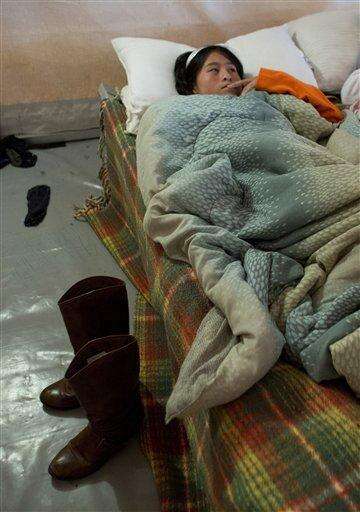
In this Jan. 5, 2016 photo, a Central American girl lies down to get some rest, alongside the donated cowboy boots she selected as her new shoes, at a center that provides assistance to newly-arrived migrant families with children at Sacred Heart Catholic Church in McAllen, Texas. Even with stepped up Mexican enforcement at its southern border, U.S. Customs and Border Protection says apprehensions of unaccompanied children at the southwest border from October through December was up 117 percent over the same period a year earlier and apprehensions of families were up 187 percent. More were caught crossing here into southernmost Texas than anywhere else. (AP Photo/Rebecca Blackwell)
The Associated Press
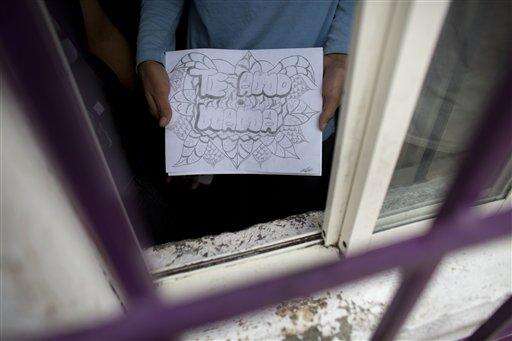
In this Jan. 6, 2016 photo, a Central American teenager holds up his drawing that reads in Spanish: "I love you, mama," at a government shelter for unaccompanied child migrants in Reynosa, Mexico. Dozens of mainly teenagers wait up to two months at the shelter until diplomatic formalities are completed for their deportation to their home countries. (AP Photo/Rebecca Blackwell)
The Associated Press
In this Jan. 4, 2016 photo, Jennifer Guarcas plays with a balloon with her mother Marleny Gonzalez at the Senda de Vida migrant shelter in Reynosa, Mexico. The 4-year-old is recovering from two broken legs and deep cuts to her arm after a truck they were traveling in overturned during their journey from Guatemala. (AP Photo/Rebecca Blackwell)
The Associated Press
In this Jan. 5, 2016 photo, Catholic Sister Norma Pimentel poses for a picture inside the center she runs to provide assistance to newly-arrived migrant families traveling with children, at Sacred Heart Catholic Church in McAllen, Texas. The American people are conscious that they are human beings, they are people and we need to treat them that way, said Pimentel who was invited to meet the pope in New York last year. They need our help and so we welcome them to restore their dignity. (AP Photo/Rebecca Blackwell)
The Associated Press
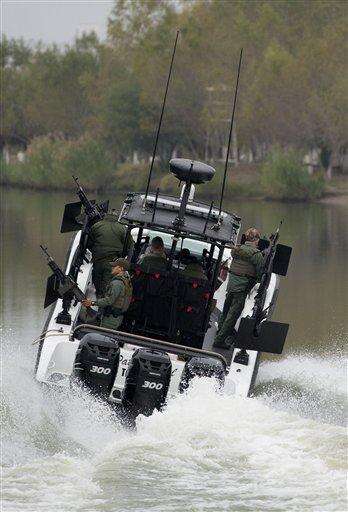
In this Jan. 6, 2016 photo, Texas state troopers speed toward a park in Reynosa, Mexico, as they head out on patrol along the Rio Grande from Anzalduas Park in Mission, Texas. Even with stepped up Mexican enforcement at its southern border, U.S. Customs and Border Protection says apprehensions of unaccompanied children at the southwest border from October through December was up 117 percent over the same period a year earlier and apprehensions of families were up 187 percent. More were caught crossing here into southernmost Texas than anywhere else. (AP Photo/Rebecca Blackwell)
The Associated Press
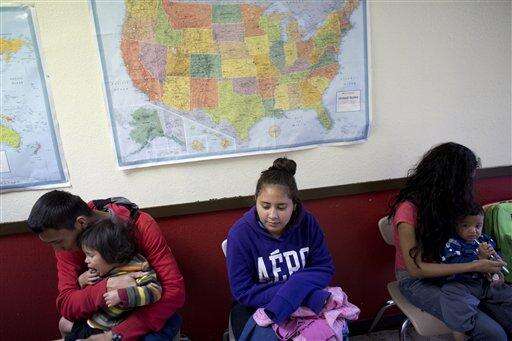
In this Jan. 5, 2016 photo, migrants wait in line to take a shower, as they sit by a U.S. map at a center that provides assistance to newly-arrived migrant families with children, at Sacred Heart Catholic Church in McAllen, Texas. ìWe must not be taken aback by their numbers, but rather view them as persons, seeing their faces and listening to their stories, trying to respond as best we can to their situation,î Pope Francis said in an address to the U.S. Congress. (AP Photo/Rebecca Blackwell)
The Associated Press
In this Jan. 5, 2016 photo, Jennifer Lorenzo of Guatemala looks around as she sits on her father's lap inside a center that provides assistance to newly-arrived migrant families with children, at Sacred Heart Catholic Church in McAllen, Texas. In January, Secretary of State John Kerry announced that a program allowing Central Americans to apply for refugee status before migrating would be expanded. (AP Photo/Rebecca Blackwell)
The Associated Press
In this Jan. 6, 2016 photo, Texas state troopers prepare to take a patrol boat out on the Rio Grande, in Anzalduas Park in Mission, Texas, a short distance across the river from Reynosa, Mexico. On Jan. 2, Immigration and Customs Enforcement agents began rounding up Central American immigrants who had entered the country illegally since May 2014 with their families and been ordered to leave by a judge. (AP Photo/Rebecca Blackwell)
The Associated Press
In this Jan. 6, 2016 photo, migrants participate in a Three Kings Day Mass at the Casa del Migrante shelter run by Catholic nuns in Reynosa, Mexico. Many migrant families are fleeing the violence of Central America. For example, in El Salvador, there were 69 percent more murders in 2015 than the previous year, a rate that could make it the worlds most violent country. Its an ignominious ranking that its neighbor Honduras has sat atop in the past. (AP Photo/Rebecca Blackwell)
The Associated Press
In this Jan. 4, 2016 photo, newly deported migrants swap stories with those waiting to cross, in the women's dormitory at the Casa del Migrante shelter run by Catholic nuns in Reynosa, Mexico. ìWe must not be taken aback by their numbers, but rather view them as persons, seeing their faces and listening to their stories, trying to respond as best we can to their situation, Pope Francis said in an address to the U.S. Congress. (AP Photo/Rebecca Blackwell)
The Associated Press
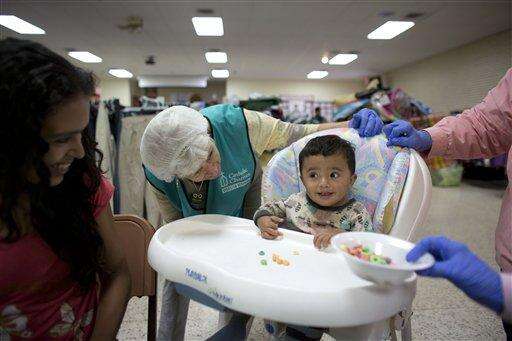
In this Jan. 5, 2016 photo, eighteen-year-old Rose Danubia Maldonado, left, looks on as volunteers offer food to her 14-month-old son Miguel Yahyr Padilla at a center that provides assistance to newly-arrived migrant families with children at Sacred Heart Catholic Church in McAllen, Texas. Pope Francis often raises the plight of immigrants seeking better lives for their families, including during a visit to the U.S. last fall and is expected to do so again in Mexico in February. (AP Photo/Rebecca Blackwell)
The Associated Press
In this Jan. 5, 2016 photo, a Romanian migrant shaves at a center that provides assistance to newly-arrived migrant families traveling with children at Sacred Heart Catholic Church in McAllen, Texas. Migrants are entering a country of stepped up border enforcement and anti-immigrant sentiments. (AP Photo/Rebecca Blackwell)
The Associated Press
In this Jan. 5, 2016 photo, a section of border wall stands in Anzalduas Park in Mission, Texas, across the Rio Grande from Reynosa, Mexico. Leading Republican presidential candidate Donald Trump has given anti-immigrant sentiment a primetime platform. In launching his candidacy last summer he said Mexico sent rapists and criminals to the U.S. He said he would deport the more than 11 million immigrants living in the U.S. illegally and try to strip U.S. birthright citizenship from babies born to parents who are not in the country legally. (AP Photo/Rebecca Blackwell)
The Associated Press